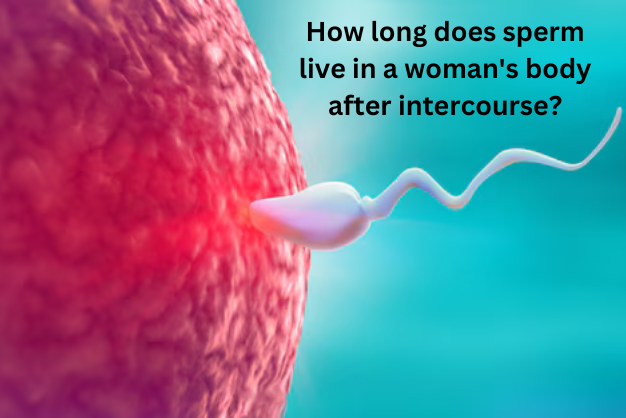How long does sperm live in a woman's body after intercourse?
Understanding how long sperm lives in a woman's body after intercourse is important for family planning and understanding fertility. Sperm can live in a woman's body for up to 5 days after intercourse. However, the exact lifespan of sperm can vary depending on several factors.
Factors That Affect Sperm Lifespan
Sperm Quality: Healthy, motile sperm can live longer than sperm that are damaged or have low motility.
Cervical Mucus: The quality and quantity of cervical mucus can affect sperm lifespan. Cervical mucus that is thin and stretchy is more hospitable to sperm than thick, sticky mucus.
Vaginal Acidity: The vagina is naturally acidic, which can kill sperm. Sperm that are ejaculated into the vagina may be exposed to acidic conditions that can shorten their lifespan.
Female Reproductive System: The health of the female reproductive system can also affect sperm lifespan. Infections or other conditions can create an environment that is hostile to sperm.
When Sperm is Most Likely to Fertilize an Egg
Sperm is most likely to fertilize an egg within 24 hours after intercourse. However, sperm can remain viable for up to 5 days in the female reproductive tract. This means that if a woman has unprotected intercourse on Monday, she may be able to get pregnant if she ovulates on Tuesday, Wednesday, Thursday, Friday, or Saturday.
How to Increase the Chances of Pregnancy
If you are trying to get pregnant, there are a few things you can do to increase your chances:
Have Sex at the Right Time: The best time to have sex for conception is during the woman's fertile window, which is typically around days 11-15 of her menstrual cycle.
Avoid Lubricants: Some lubricants can kill sperm. If you need to use a lubricant, talk to your doctor about the best option.
Lie Down After Sex: Lying down after sex can help sperm travel to the uterus.
See a Fertility Specialist: If you have been trying to get pregnant for more than a year and have not been successful, you may want to see a fertility specialist.
Conclusion
Sperm can live in a woman's body for up to 5 days after intercourse. However, the exact lifespan of sperm can vary depending on several factors. If you are trying to get pregnant, it is important to have sex at the right time and to avoid doing anything that could harm sperm. You may also want to see a fertility specialist for help.
About New World Fertility Centre
New World Fertility Centre is the best fertility clinic in India. We offer a wide range of fertility treatments, including IVF, IUI, and egg freezing. Our experienced team of fertility specialists is dedicated to helping couples achieve their dream of having a baby.
[+91-844-8786-106]
[https://newworldfertility.com]
Frequently Asked Questions (FAQs)
1. How long can sperm survive in a woman’s body?
Sperm can survive in a woman’s body for up to five days under optimal conditions, particularly around ovulation. Without fertile cervical mucus, sperm typically only survives for a few hours to one day.
2. What factors influence sperm lifespan?
Several factors affect sperm longevity, including:
- The quality of cervical mucus (which is more fertile around ovulation)
- Ovulation timing
- Overall sperm health and motility
- The vaginal environment, which can be hostile outside the fertile window
3. What is cervical mucus, and how does it affect sperm survival?
Cervical mucus is a fluid produced by the cervix. During ovulation, it becomes slippery and more alkaline, which helps nourish and protect sperm, allowing it to survive for longer. Outside of ovulation, cervical mucus becomes thicker and more acidic, making it harder for sperm to live.
4. Can sperm live for more than five days?
While sperm can survive for up to five days in a woman’s reproductive tract, it is rare for it to live beyond this period. Fertility experts suggest aiming for intercourse within this five-day window for the best chances of conception.
5. When is the best time to have intercourse for conception?
The best time is during the fertile window, which occurs a few days before and during ovulation. Since sperm can live for several days, having intercourse in the days leading up to ovulation increases the chances of sperm being present when the egg is released.

 Sep-27-2024
Sep-27-2024